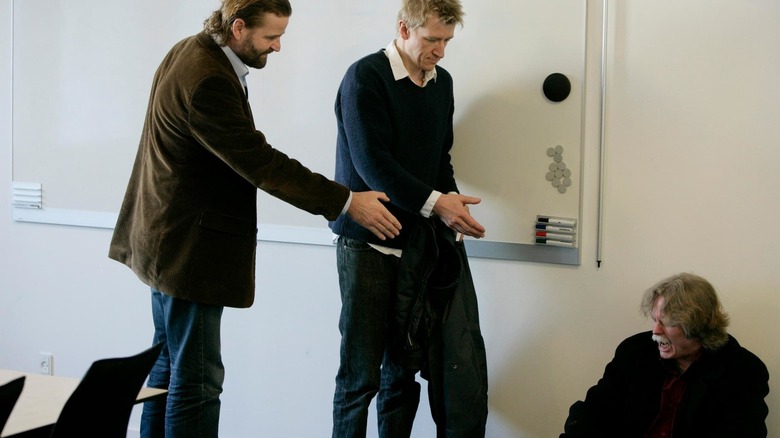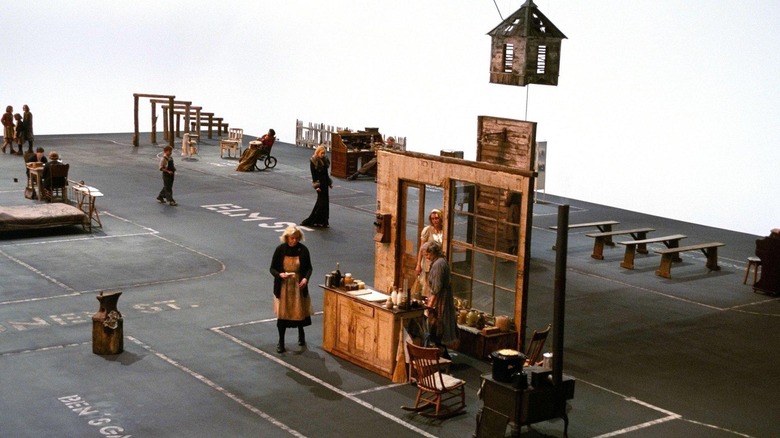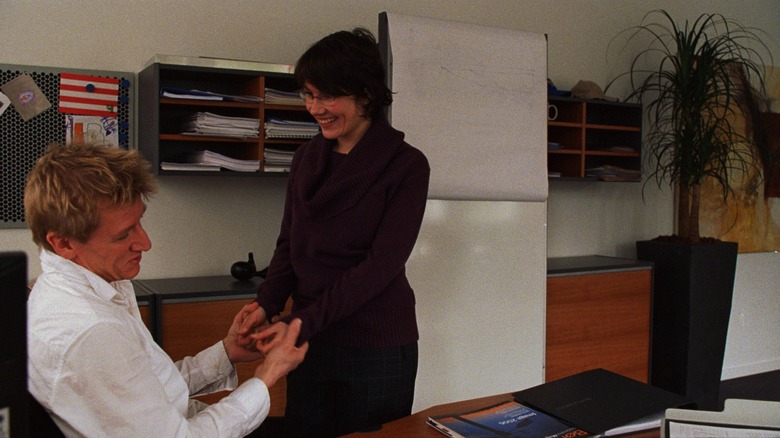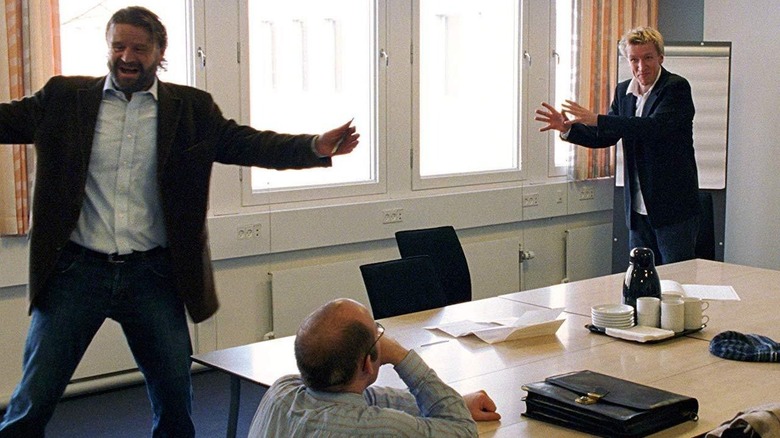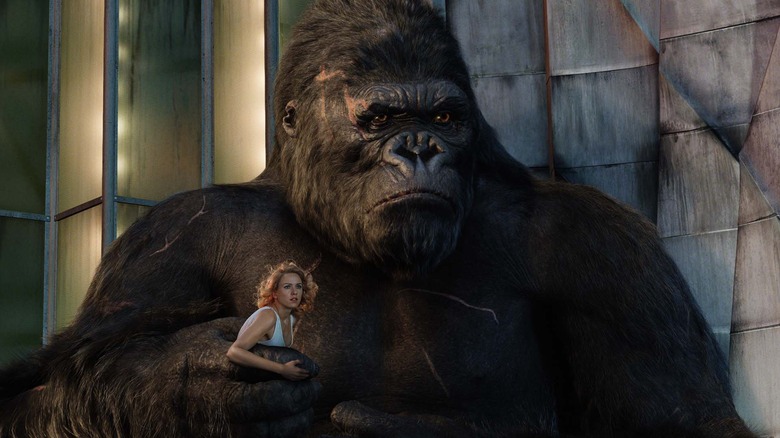There Is One Filmmaker And One Filmmaker Only Who Should Be Allowed To Work With A.I.
As of this writing, the 2023 Writers Guild of America strike is still in effect. Writers were not receiving enough money in residuals over streaming media and many were concerned that studios were going to turn to A.I. chatbot programs to rely on stories and even dialogue for a lot of their output. A writer, they logically argued, should be a person who writes, not a word-scanning program that can recreate blended facsimiles of scripts that had come before.
Those who have read A.I.-generated scripts can also see that they fall short of human writers by a cavernous margin. While A.I. has impressively been able to nail the context of language, the structure of a screenplay, and even basic human syntax, they cannot deviate from structure or conceive of an original premise/emotional scenario. A.I. seems handy for producers who only want to recreate screenwriting templates that were successful in the past. A.I. is certainly not being used for filmmakers or for audiences.
Perhaps someday in the distant future, machines will become self-aware and might be able to communicate the emotions they actually feel. But until that "Star Trek" epoch, maybe pay writers what they're owed and don't threaten their jobs with algorithms.
Of course, even with this sentiment aired, one might still find themselves morbidly curious. If a studio did allow an A.I. program to "write" an entire script and then allowed that script to be put into production, what would it look like? Would it be paced like a real movie? What would the characters be like? How would actors, eager to delve into their characters, interpret automated lines? And what kind of director would want to delve into the creative mind of a machine?
If we're to have that experiment, let it come from Lars Von Trier.
Lars Von Trier
Lars Von Trier, for those unfamiliar with the Danish "bad boy" of cinema, has long been a caustically confrontational filmmaker. He points his camera at humanity at its worst, usually at times when depression and cruelty have overwhelmed their better judgment. Some of his films are glorious works of art that rip open the human brain and lay bare humanity's darkest impulses. Others seem to be shocking for the sake of it. With his films "Dogville" and "Manderlay," Von Trier sought to explode American notions of Christian decency by revealing that servitude and racism lurk underneath everything. With "Dancer in the Dark," he showed that keeping a promise is tantamount to self-destruction. Von Trier looked at the bowels of depression with a trilogy of films — "Antichrist," "Melancholia," and "Nymphomaniac" — which were all careful and elegant movies, if not frequently brutal.
(If you watch "Nymphomaniac," turn off the film when Stellan Skarsgård leaves the room. The last 90 seconds ruin the previous five hours.)
One might accuse Von Trier of being a cynic. His films certainly bear out that accusation. Von Trier seems to feel that humanity is incapable of civility. When it comes to filmmaking, though, Von Trier has often pushed the envelope to an aggressive degree. In the mid-1990s, he co-founded the notorious Dogme 95 movement, which was a style of filmmaking — complete with a strict manifesto of rules — that sought to rid all artificiality from movies; no music, no makeup, no artificial lighting, etc. With "Dogville," he rid his movie of sets, having his buildings reduced to mere diagrams on the floor.
Finally, in 2006, Von Trier took his first dip into A.I. filmmaking with "The Boss of It All," a movie photographed by motion-tracking software.
The Boss of It All
The premise of "The Boss of It All" is unusually light and silly for a Lars Von Trier movie. The owner of an IT firm named Ravn (Peter Gantzler) often has to make difficult decisions at his job. To cover his own reputation, Ravn invented a mysterious American "owner" for his business that only communicated to the staff via e-mail. All Ravn's good decisions he could claim for himself and all the bad ones he could attribute to his imaginary benefactor. When Ravn wants to sell his company, however, the fake American owner needs to appear in the flesh, so Ravn hires an actor (Jens Albinus) to stand in. In the fashion of a farce, nothing goes to plan.
The gimmick of "The Boss of It All," however, was Von Trier's curious cinematographic experiment. There was no cinematographer on set and the camera was locked into place at the beginning of a scene. A computer would then — seemingly randomly — move and frame shots according to its own automated whims. "The Boss of It All" may be the first A.I.-assisted feature film. Von Trier called it Automavision.
Notably, the film looked like ass. The look was murky, actors were often out of frame, and the computer often chose to look at banal corners of a room rather than the actors in it.
Von Trier's hypothesis was twofold. On the one hand, he seemed to want to explore what a human hand brings to a film by illustrating what a movie would look like without it. If you feel that cinematographers don't have vitally important jobs, "The Boss of It All" proves they do.
Don't blame me. It was the A.I.
Secondly, Lars Von Trier aimed to use attitudes about A.I. to diffuse blame. Like the content of "The Boss of It All," Von Trier gave himself an excuse if an audience member criticized his movie. It wasn't me, he would be able to say impishly, it was the computer.
That secondary "excuse" seems exactly why Von Trier would be ideally suited to make a film with an A.I.-generated script. Given the filmmaker's bent for experimentation and prankstership, Von Trier could conceivably present, as plainly and earnestly as possible, a movie wherein actors were forced to read unusual, inhuman, computerized lines. Passionate and frustrated actors would likely struggle to make bland machine dialogue sound natural and Von Trier would want to capture that struggle. With a deconstructionist attitude, someone like Von Trier would be eager to destroy cinema from within, laying bare a dark future that studios seem to be currently gunning for.
Von Trier would not try to avoid making a terrible movie. Indeed, he seems like the type of filmmaker who would happily make something awful just to prove a point. As with "The Boss of It All," the awfulness would be the film's raison d'être.
Few other filmmakers would be so galling. Werner Herzog might be interested in the results of an A.I. experiment but surely wouldn't want to make it. Same with the tech-hungry David Cronenberg, a filmmaker who likes high-tech gimmicks, but still works with analog tools. Cronenberg's sci-fi films aren't shiny or mechanical, but fleshy and bloody. Gun Van Sant likely had his fill of experiments with his 1998 version of "Psycho."
No, it seems that Von Trier is the one troublemaker with the chutzpah to let A.I. be the star — and not in a positive way.
Who not to give A.I. to
There are, of course, several filmmakers out there who are seemingly eager to try out new toys as they enter the cinematic landscape. Sometimes trends can even get the better of a filmmaker. Remember when Martin Scorsese made a film in 3D?
A filmmaker who is deeply interested in the evolution of cinema — and wishes to make use of all of its newest tools — is exactly the wrong kind of filmmaker to explore and experiment with A.I. scripting. Here I refer specifically to Peter Jackson, who has been toying with extensive CGI effects ever since he made "The Frighteners" back in 1996. Since then, the bulk of Jackson's output has made use of state-of-the-art effects and high-frame-rate photography to realize all manner of creatures and fantasy worlds. The results have been mixed. Yes, the effects have been dazzling, but Jackson now fixates on technique over story and character. Films like "King Kong" lack a vital sense of humanity. His 2018 documentary "They Shall Not Grow Old" was largely at attempt to make footage from the 1910s look as modern as possible.
Ang Lee and James Cameron have also been infamously tinkering with high frame rates, hoping to move past the long-held visual standard of 24fps. While Cameron's "Avatar: The Way of Water" made good use of high frame rates, Lee's movies like "Gemini Man" and "Billy Lynn's Long Halftime Walk" didn't.
Jackson, Lee, and Cameron are the worst possible filmmakers to handle A.I. They would want to prove that a good movie could be made with it and examine the machine intelligence in a positive, explorative way. Still interesting, but is that what we want?
No, we want a cynic. And, golly, Lars Von Trier is the cynic we need.
